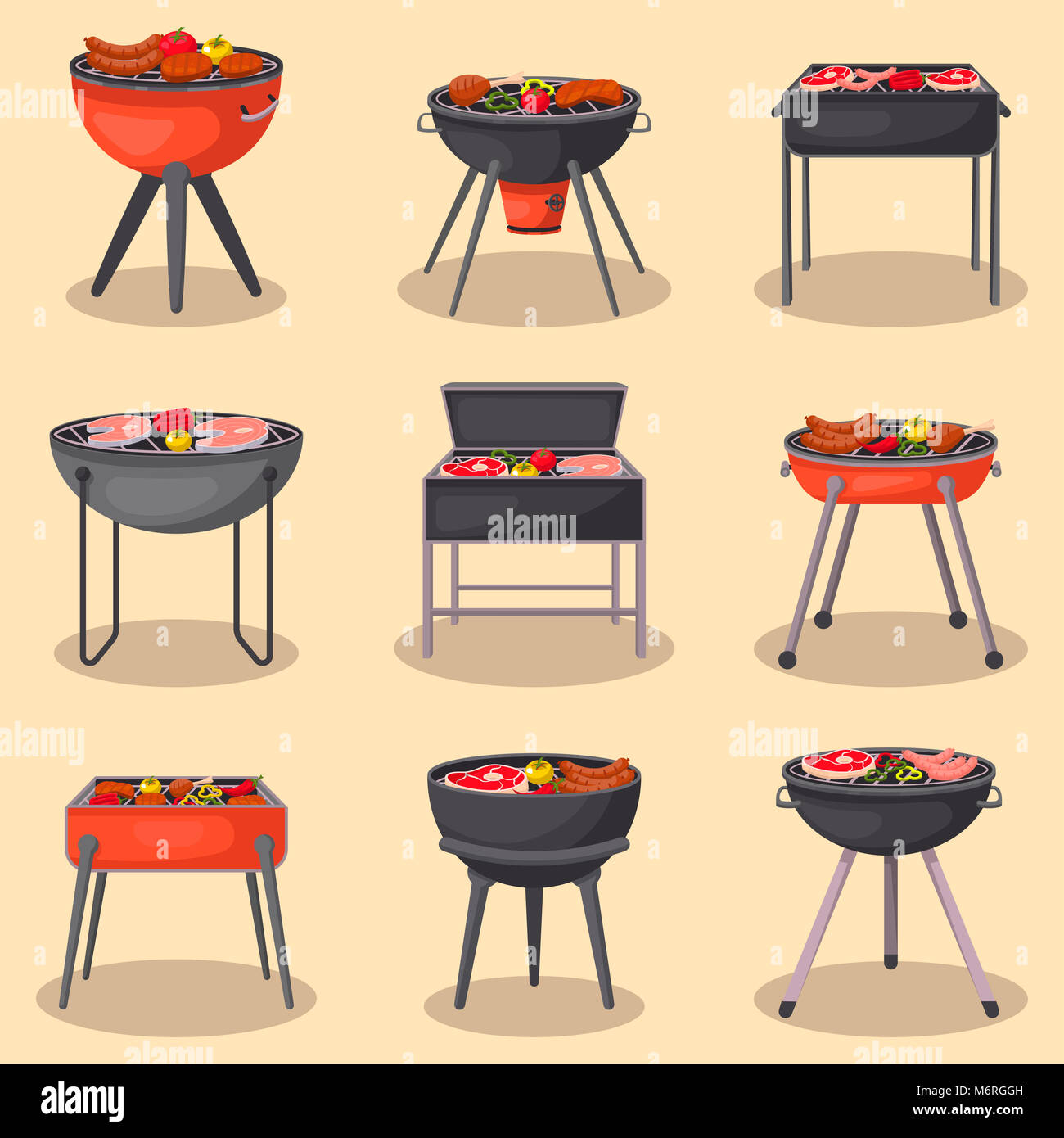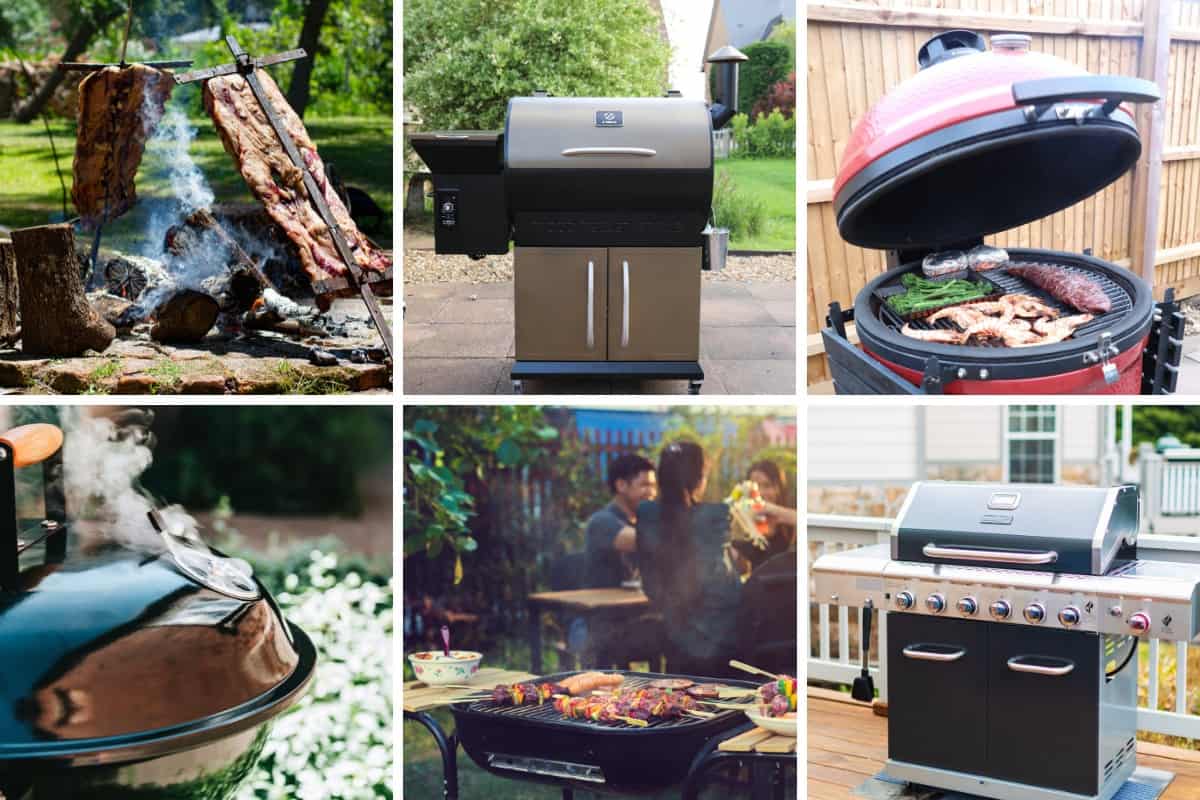When it comes to outdoor cooking, selecting the right grill can significantly impact your cooking experience. Whether you're seeking authentic smoky flavors, quick and easy meal prep, or grilling versatility, understanding the different types of grills will help you make the best choice. In this guide, we’ll explore the most popular grills, highlighting their advantages and limitations so you can make an informed decision for your next barbecue adventure.
Charcoal Grills: The Classic Choice for Smoky Flavor
Charcoal grills are a go-to option for those who want that deep, smoky taste that only comes from cooking over hot coals. These grills use charcoal briquettes or lump charcoal, which infuse food with a distinct, rich flavor that’s hard to replicate with other grill types.
Advantages:
- Unmatched Smoky Flavor: The smoky aroma from burning charcoal gives food a unique, deep flavor, particularly when cooking meats.
- High Heat for Searing: Charcoal grills can reach very high temperatures, making them ideal for achieving a perfect sear on steaks and other meats.
- Portability: Many charcoal models are compact and easy to transport, perfect for camping or tailgating.
- Affordability: Charcoal grills are typically less expensive than other types, making them a budget-friendly choice.
Limitations:
- Long Preheat Time: Charcoal can take up to 40 minutes to heat, which is less convenient than gas or electric grills.
- Messy Cleanup: Ash and burnt charcoal require more effort to clean.
- Temperature Control: Achieving precise temperature control can be challenging with charcoal grills.
Gas Grills: Quick, Convenient, and User-Friendly
Gas grills are popular for their convenience and efficiency. Powered by propane or natural gas, they offer quick ignition, precise heat control, and are easy to maintain, making them ideal for busy grillers.
Advantages:
- Instant Ignition: Gas grills start up in seconds, and you're ready to cook in minutes.
- Easy Temperature Control: With adjustable knobs, you can easily control the heat, perfect for grilling various types of food at different temperatures.
- Less Mess: Gas grills produce less smoke and ash, making cleanup a breeze.
- Versatility: Many gas grills feature extras like side burners, rotisseries, or griddles for expanded cooking options.
Limitations:
- Less Flavorful: Gas grills don’t deliver the same smoky flavor as charcoal grills, though some models have smoker boxes to enhance taste.
- Higher Cost: Gas grills can be more expensive upfront compared to charcoal options, especially with premium models.
- Fuel Dependency: You’ll need a steady supply of propane or a natural gas connection, which can limit mobility.
Electric Grills: Perfect for Indoor and Outdoor Cooking
Electric grills are ideal for those who live in areas with fire restrictions or who want a grill that can be used indoors. Powered by electricity, these grills are perfect for apartment balconies or small spaces where gas or charcoal grills may not be permitted.
Advantages:
- Easy to Use: Simply plug in and grill. Electric grills heat up quickly and don’t require charcoal or propane.
- Indoor and Outdoor Flexibility: Since they don’t produce open flames, electric grills can be used inside or outside, making them versatile for year-round use.
- Compact Design: Most electric grills are compact, perfect for smaller living spaces.
Limitations:
- Limited Flavor: Electric grills lack the smoky, grilled flavor that gas and charcoal grills provide.
- Heat Restrictions: These grills don’t reach the high temperatures necessary for tasks like searing meats.
- Dependent on Power: Electric grills must be plugged in, limiting portability and making them unsuitable for camping or remote areas.

Pellet Grills: The Best of Both Worlds
Pellet grills combine the flavor of wood-fired cooking with the convenience of modern technology. These grills use compressed wood pellets as fuel and feature electronic controls that feed pellets into the fire to maintain precise temperatures.
Advantages:
- Wood-Fired Flavor: The wood pellets infuse food with a rich, smoky flavor, much like a charcoal grill.
- Precise Temperature Control: Pellet grills often have digital controls for adjusting the temperature with precision.
- Versatility: These grills can smoke, bake, roast, and grill, making them one of the most adaptable options.
Limitations:
- Higher Cost: Pellet grills are typically more expensive than charcoal and gas models.
- Electricity Needed: Like electric grills, pellet grills require an outlet to power their controls, limiting mobility.
- Ongoing Maintenance: Regular cleaning of the pellet hopper and mechanisms is required to ensure consistent performance.
Kamado Grills: Superior Heat Retention and Efficiency
Kamado grills, often made from ceramic, are known for their excellent heat retention and versatility. They use charcoal but offer more precise temperature control and can serve as grills, smokers, or ovens.
Advantages:
- Exceptional Heat Retention: The thick ceramic construction retains heat well, making Kamado grills highly fuel-efficient.
- Versatile Cooking Options: From smoking at low temperatures to baking pizzas at high heat, Kamado grills can handle a wide range of cooking tasks.
- Durability: Built to last, these grills are constructed from heavy-duty materials designed for long-term use.
Limitations:
- Expensive: Kamado grills are pricier than other charcoal grills due to their ceramic build and heat efficiency.
- Heavy: Their weight makes them less portable than other grill types.
- Learning Curve: Adjusting air vents for precise temperature control can take practice.

Portable Grills: Grilling on the Go
Portable grills are designed for easy transport, making them ideal for camping, picnics, or tailgating. Available in gas, charcoal, and electric models, these grills offer flexibility wherever you are.
Advantages:
- Highly Portable: Compact and lightweight, these grills are easy to pack and transport.
- Affordable: Portable grills are generally more budget-friendly compared to full-sized grills.
- Variety of Fuel Options: Whether you prefer charcoal, gas, or electric, portable grills come in various fuel types to suit your needs.
Limitations:
- Limited Cooking Space: The smaller surface area may not be enough for cooking large quantities of food.
- Less Temperature Control: Some portable models lack the fine temperature control found in full-sized grills.
Conclusion: Find the Right Grill for Your Needs
The perfect grill depends on your personal preferences, cooking style, and outdoor space. Whether you want the smoky flavor of a charcoal grill, the convenience of a gas grill, or the year-round flexibility of an electric grill, there’s a perfect match for every grilling enthusiast. By understanding the strengths and limitations of each type, you can confidently choose the grill that will elevate your outdoor cooking game and deliver delicious results every time.
